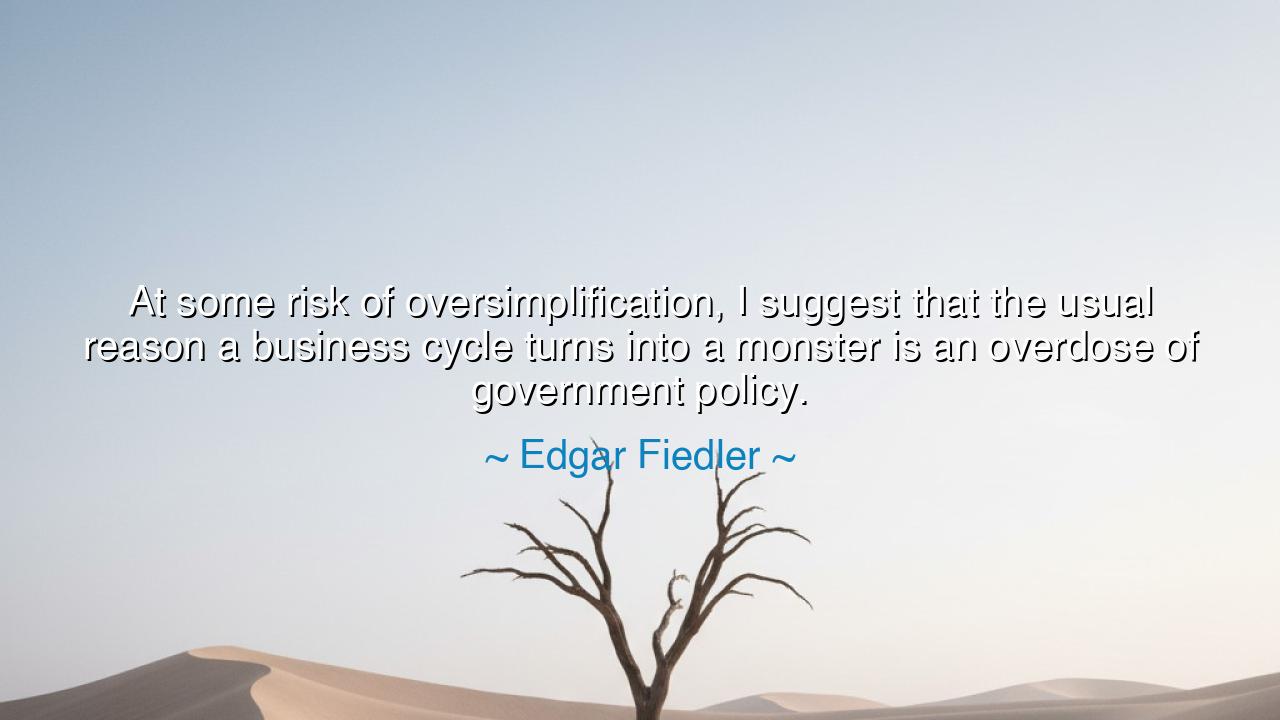
At some risk of oversimplification, I suggest that the usual
At some risk of oversimplification, I suggest that the usual reason a business cycle turns into a monster is an overdose of government policy.






The words of Edgar Fiedler, the keen economist and humble servant of truth, strike with the weight of warning and the calm authority of experience: “At some risk of oversimplification, I suggest that the usual reason a business cycle turns into a monster is an overdose of government policy.” Beneath these measured words lies not cynicism, but the sorrowful wisdom of a man who had witnessed both prosperity and peril. Fiedler speaks as one who knows that while government may act from good intentions, too much interference in the rhythm of an economy—like a doctor over-medicating a patient—can transform natural cycles of growth and decline into destructive storms. His message is simple, yet profound: even in the pursuit of good, excess is peril.
At its heart, this quote is a reflection on the fragility of balance—the eternal struggle between freedom and control. The business cycle, that rise and fall of production, trade, and employment, is as natural to human industry as the changing of the seasons is to the earth. There are times of sowing and times of harvest, times of expansion and times of correction. But when government policy—through taxation, regulation, or the manipulation of money—tries to conquer this natural order, it often amplifies rather than mends the instability. Fiedler warns that what begins as guidance may end in domination; what starts as medicine may turn into poison. For the economy, like life itself, cannot be perfectly engineered by decree—it must be understood, respected, and allowed to breathe.
The origin of these words lies in the turbulent economic years of the 1970s, when Fiedler, as an advisor to both the Treasury and private institutions, observed firsthand the effects of overactive policymaking. Governments, seeking to cure inflation, unemployment, and recession all at once, flooded the economy with interventions—printing money, freezing wages, controlling prices, and shifting fiscal levers in rapid succession. The result was not stability, but chaos: stagflation, a beast with the head of inflation and the body of stagnation, devouring the prosperity of nations. It was in witnessing such times that Fiedler penned his warning—an appeal to humility, a reminder that no policy, however noble, can escape the laws of economic nature.
History offers many mirrors to his truth. In the early years of the Great Depression, for example, the U.S. government, fearing economic collapse, took measures that deepened it instead. The Federal Reserve tightened money when it should have eased; protectionist laws like Smoot-Hawley strangled trade; and heavy taxation stifled the very enterprise that could have reignited growth. The intentions were patriotic—but the effects were ruinous. What began as a downturn became a decade-long catastrophe, a “monster,” in Fiedler’s words, born from an overdose of policy. Likewise, in later decades, governments that sought to manipulate economies too tightly often found themselves victims of their own ambition—proof that even the wisest hands tremble when they try to steer the invisible forces of human enterprise.
Fiedler’s insight, though economic in form, carries moral and philosophical weight. It speaks to a universal truth: that excess of control destroys vitality. Just as a gardener who overwaters kills the roots, or a ruler who overgoverns suffocates the people, so too does an overreaching government drain the lifeblood of innovation and resilience. In every field of life, balance is the essence of wisdom. Freedom without order is chaos; but order without freedom is death. Fiedler’s words remind us that the best leaders are those who act not as masters, but as stewards—those who understand that to sustain prosperity, one must trust in the self-correcting strength of a free people.
There is also a lesson here for every individual, not just for nations. In our own lives, we are often tempted to “overcorrect” the moments of difficulty—to force outcomes, to overmanage, to fear the natural ebb and flow of fortune. But just as in economics, such attempts often create new imbalances. Patience, humility, and trust in the natural cycle of effort and reward are virtues as valuable to the soul as to the marketplace. Sometimes, what we must do is not to control more, but to interfere less, allowing time and wisdom to restore equilibrium.
Thus, Fiedler’s message, though born from the study of markets, ascends to the realm of timeless truth: the greatest wisdom lies not in doing more, but in knowing when to stop. Governments, like men, must learn restraint, for even noble intentions can birth monsters when divorced from prudence. The freedom of a nation, like the vitality of its economy, thrives only when guided by principle, not smothered by policy.
So let these words stand as a monument of caution and hope: “An overdose of government policy” is not merely an economic error—it is a moral failing, a loss of faith in the people’s ability to grow, adapt, and endure. The wise ruler, the wise citizen, and the wise soul all understand the same law: that life, liberty, and prosperity are not perfected through control, but through balance, patience, and trust in the order of creation. For when power learns restraint, the cycle of life returns to harmony, and from that harmony comes the strength of nations and the peace of men.






AAdministratorAdministrator
Welcome, honored guests. Please leave a comment, we will respond soon